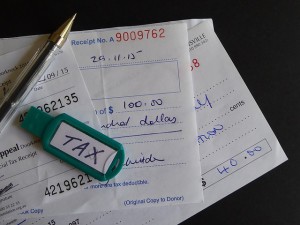Receipts: What to Keep and Why
When you organize your financial records, it’s important to keep track of your spending, and with your spending comes receipts. When going on a typical shopping trip, it’s easy to accumulate multiple receipts quickly, as you may visit several stores, grab a meal, and fill up your car with gasoline. Beginner budgeters may find themselves wondering, “Which receipts should I save?” and “How long do I need to keep them?” as they quickly accumulate a stack of paper from saving their receipts.
The Four Receipt Criteria
Before you throw away a receipt after making a purchase, go through this mental checklist:
- Will I want to return this purchase later?
- Is this purchase worth 10% or more of what I expect to spend this month?
- Do I need this receipt if something breaks?
- Will I want to claim this purchase on my taxes?
Taking a moment to reflect on these questions could save you big time in the future!
Receipts for Returns

This is the easiest decision. In almost every case, you’ll have a very hard time returning an item to the store if you don’t have a receipt to prove you made the purchase. This means that for clothing, appliances, or any item that could be defective or break, you will want to save the receipt.
How long should I save them?
Returns are usually accepted within 30 to 60 days from the time of purchase. This makes it easy: you can throw these receipts away after you’ve reconciled your financial statements, and you’re sure you don’t want to return your purchase.
Account reconciliation is when you review your past purchases against your bank or credit card statement to make sure there were no errors. Keeping these receipts separate from the rest of your financial documents will make it easier to discard them on a regular basis.
10% Purchase Receipts
If you think a purchase will account for 10% or more of that month’s spending, you should keep the receipt for when you do your account reconciliation. Due to the substantial amount of money spent for these purchases, it may be beneficial to compare the receipt with the stated purchase price to ensure that you have not been overcharged.
How long should I save them?
If you do not need these for tax reasons, you can safely throw these away as soon as you finish your account reconciliation.
Warranty Receipts
Many items typically come with a warranty, such as electronics, appliances, automobiles, furniture, and tools. A warranty is a guarantee given by the manufacturer or seller of a product that it will meet certain standards or expectations. It typically covers the cost of repairs or a replacement of the product if it fails to meet those standards. If something breaks or there is a defect in the warranty period, the manufacturer will usually replace it free of charge.
Warranties cover items such as a new TV or cell phone, car repairs done by a licensed mechanic, a new video game console, and other expensive items.
How long should I save them?
If a product comes with a warranty, you will want to keep the receipt plus proof of the warranty for as long as you own the product. If you paid for a service that came with a warranty, you will want to keep the service paperwork and warranty for the life of the warranty period. Find a safe place in your home, such as in a filing cabinet, to keep this paperwork organized. You’ll be grateful you have it well organized in case something goes wrong.
Tax Purchases

You might be surprised at what types of deductions you can claim on your taxes. Did you pay for any tuition or job training? You can claim it! Did you need to buy something required for work, like a uniform? You can claim that too! Depending on where you live, you might be able to claim what you spent on public transit, improvements to your house, and much more.
If what you bought can be claimed on your taxes, you need to keep your receipts much longer, and it’s a lot more important to keep them organized. You’ll be grateful to have your paperwork in order if you’re ever audited.
How long should I save them?
If you claim something on your taxes, you need to keep the receipt for at least seven years. This is the threshold for the IRS to audit your tax filings. Then, if the IRS does decide to audit you, you will have the necessary paperwork to show that you made those purchases. After seven years, you can ceremoniously throw away all these receipts to make room for a new batch!
Electronic Receipts
Many retailers now give the option to have receipts emailed to you electronically. If you take this option, you can set up folders in your email account where you can move everything quickly and easily for future reference – without having to worry about paper files.
Try It!
Try matching the following receipts to the category for how long you should save them. Some items can fit in more than one place!
Challenge Questions
- When was the last time reviewed a receipt for any errors?
- How can purchase receipts help you monitor your spending?
- Have you ever returned a product to a store? Were you asked for a receipt?
- How do purchase receipts help you with taxes?
- What are the benefits of double-checking your purchase receipts?